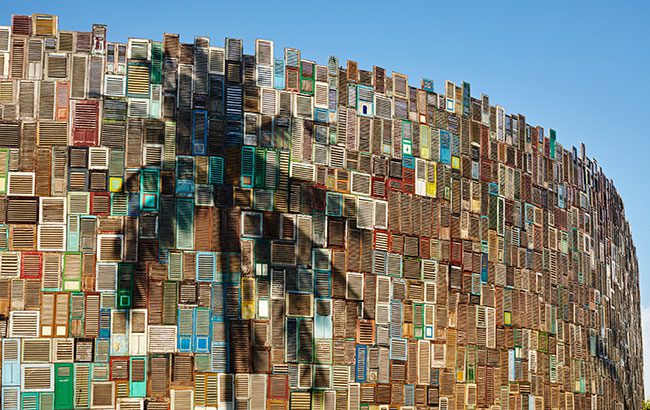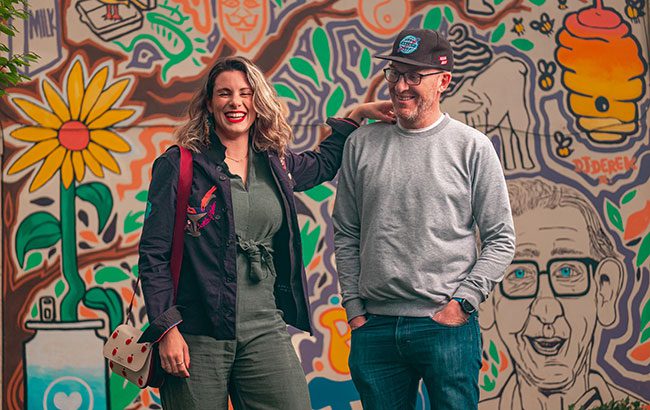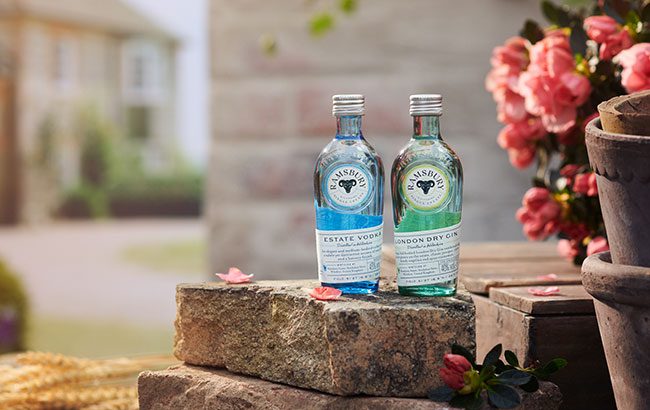Why closed-loop systems are key to a greener spirits industry
By Lauren EadsWith environmental degradation an increasing threat, now could be the time for spirits brands to invest in closed-loop systems.

*This feature was originally published in the July 2025 issue of The Spirits Business magazine.
Many people will remember the unmistakable clink of the milk float. The distinctive vehicles delivered milk in glass bottles in the UK from the 1930s to the 1990s, peaking in the 1970s. The concept was simple – have glass bottles delivered, refilled and redelivered to your door instead of using bottles bought at a shop. It was so logical that we didn’t need a fancy name for it. Today, we recognise it as one of the most efficient examples of a ‘closed-loop system’ – where materials are reused continuously, eliminating waste and energy in the supply chain and lessening the use of raw materials to lower their environmental impact. The beer industry’s steel keg is another example. The spirits industry has been slower on the uptake (and is not alone) but is also embracing closed-loop systems in packaging, production and distribution.
It is important because improving production and sustainability are “critical to the survival of the spirits industry”, says Paul Mathew, founder of non-alcoholic ‘spirit’ Everleaf. “From a lofty perspective, the world requires it. The industry uses a lot of water, energy and resources that we can’t just keep taking without consideration. Spirits businesses require it too, as all our costs are increasing dramatically, so efficiency and retaining value helps us to thrive too – whether that’s reducing our glass and shipping costs, or managing the cycle of agricultural price fluctuations that regularly threaten things like agave spirits.”
Need for change
Major brands are already on board, and recognise the need for change. But EcoSpirits was the first to create a circular spirits packaging and distribution system at scale. Founded in 2018 by Canadian-born entrepreneur and CEO, Paul Gabie, its reusable glass EcoTotes replace single-use bottles, and can be cleaned, refilled, and redelivered continuously, primarily to on-trade venues worldwide. Gabie was importing Sipsmith Gin from London to Singapore in 2014 when he questioned the logic of shipping single-use heavy glass bottles halfway around the world only to throw them away, sometimes in less than an hour.
“We realised that if it’s reusable you can have enormous environmental benefits, and thought there must be something out there, let’s just licence the technology in Singapore,” he explains. “But there was no such thing as circular packaging for premium spirits. That began the EcoSpirits journey.”

EcoSpirits’ system reduces packaging waste by 95% and carbon emissions by 60%-90%, on average, with Rémy Cointreau and Pernod Ricard (which both own minority stakes in the firm) as partners alongside Diageo and De Kuyper. Its collaboration with Bacardi and Carnival Cruise Lines sees 4.5-litre reusable EcoTotes served to passengers on three ships, with empty totes offloaded, sanitised, and reloaded. A similar programme is under way with Havana Club rum at several all-inclusive resorts in Cuba. “The most natural application for a circular solution like ours is in the higher volume, more concentrated segments of the on-premise,” adds Gabie.
What about the off-trade? Here, brands rely on shelf appeal of individual bottles, but also the willingness of consumers to return and refill containers. In 2024, EcoSpirits partnered with French retailer La Maison du Whisky, allowing consumers to refill bottles in store, but a scalable solution for larger sites has not been found. “Fundamentally, we believe it involves a change of consumer behaviour,” says Gabie. “You can see how long it’s taken for us all to adapt to bringing our shopping bags back, you can imagine how much more it will take for consumers to bring back their wine or gin bottles. I’m optimistic that solutions will move in this direction, but you can’t be too far ahead of the consumer – it just doesn’t work.”
Many brands are investing in lighter, more recyclable glass, paper and aluminium bottles. But if recycling them requires high energy, are they wasting their time? Recycling is preferable to landfill, but not all materials are recycled equally. Glass is infinitely recyclable, but it is energy-intensive to do so. Its clarity also diminishes overtime – reuse is the gold standard. Recycling aluminium is more efficient, and uses significantly less energy than recycling glass. In 2023 UK company Sustainaholics launched its Alumini miniatures, which are now used by several airlines, and are made from 100% recycled and recyclable aluminium. For its founder, David Mills, a closed-loop system should remove the need to extract virgin raw materials. “It’s crucial to support this goal by designing reusable and/or recyclable packaging made from 100%-recyclable materials,” he says. “Instead of designing packaging that creates demand to extract more virgin raw materials, we should use and reuse existing materials better.”
Closing the loop on packaging and distribution is vital, but it’s only part of the equation – a bottle’s impact begins long before it hits the shelves. “The biggest risk to our industry is the disruption of our agricultural inputs, because agriculture is the industry that’s most at risk from climate change,” explains Tim Etherington-Judge, co-founder of “climate-positive” Calvados Avallen, and sustainability consultancy, Avallen Solutions. Moving to more regenerative methods of farming, away from industrial mono crops that have to be replanted each year, and using biannual or perennial wheat varieties, is a good first step.
“They’re single-use plants essentially,” he says. “You have to dig up the soil, which damages its health, releases carbon dioxide, and dries it out, so you need more irrigation. More of that soil will end up in rivers, which damages them, and impacts the ocean.”
England’s Fielden Whisky is one distiller that already practises regenerative farming, while Diageo has launched regenerative agriculture programmes in Scotland and Mexico to improve biodiversity, water conservation, carbon reduction, and soil health.
Water is another precious resource. Global water demand is projected to increase by 55% by 2050, according to the UN. By then, it’s estimated that half the world’s population will live in water-stressed areas. “The way we value, manage, and consume water must fundamentally change,” writes Etherington-Judge. “It is, after all, our most indispensable ingredient.”
For Avallen, irrigation of its apple orchards in Calvados is prohibited, and because it recirculates the water used to clean its apples 25 times, each bottle uses 1.2 litres of water to make, compared with the 32l industry average. Stock Spirits is focusing on water conservation at its Lublin Distillery in Poland, which has a closed-loop water-rectification system that saves up to 100m litres annually.
Ramsbury Distillery in Wiltshire, England, also follows a “closed-loop philosophy”, growing its own wheat for vodka and gin, treating wastewater on-site, using biomass to power the distillery, and feeding spent grain to local livestock. “Maintaining this system is a daily discipline that comes with logistical complexity, but long-term cost benefits,” says Nikolas Fordham, master distiller and general manager. “Our customers consistently tell us that our sustainable approach is one of the reasons they choose Ramsbury. It’s harder, yes – but it’s worth it.”
Most producers have good intentions with regards to sustainability, but the initial financial outlay isn’t always viable, especially when many businesses are already under pressure. “I’m also an on-trade operator, and margins have become so razor-thin that it’s about survival rather than investing in our future,” adds Mathew. “It has got to make economic sense, so we buy some spirits in bulk from local distillers, cutting out waste and transport miles for us, and cost of bottles, labels and shipping glass for them; we can only do that because of our locally produced London focus.”

Iwan Kurniawan, sustainability and food-and-beverage director at the five-star Potato Head beach club in Bali, a leader in sustainability in the hospitality industry, agrees. “Many of the properties we engage with are genuinely interested in adopting closed-loop systems, but they often don’t have the internal resources or budget to make it happen,” he says. Potato Head operates a zero-waste restaurant and bar programme, and has developed circular packaging solutions to reduce single-use waste. It’s “zero-waste” chef is tasked with taking by-products from the kitchen and bar and giving them a second life, turning shrimp shells into crackers, for example.
But even with financial support, a lack of alignment across the supply chain can be restrictive, adds Radosław Lewandowski, sustainability director at Stock Spirits. “Producers may invest in sustainable solutions, but without support from retailers and informed consumer behaviour, the full potential of a closed-loop system is difficult to achieve.”
Perfecting closed-loop systems requires investment, time, and commitment, but the cost of inaction is far graver, warns Fordham. “Environmental degradation threatens the very resources the spirits industry relies on – clean water, fertile soil, and a stable climate. From a commercial perspective, rising costs and tightening regulations are inevitable consequences, and reputationally, today’s consumers are becoming deeply attuned to sustainability.” Put bluntly, producers that fail to become sustainable will ultimately become unsustainable.
Can circularity in spirits go mainstream? “It’s realistic – but it won’t happen overnight,” says Fordham. “It requires both top-down regulation and grassroots innovation. As more producers prove that sustainability and profitability can go hand in hand, and as consumers demand transparency, closed-loop systems will gain traction. It may not look the same for every brand, but the principles can – and should – become industry standard.”
We’ve come a long way since plastic straws and excessive waste, but the industry needs to push harder.
“The mindset is shifting,” adds Kurniawan. “The industry is moving in the right direction. It’s just a matter of time before more operators realise the value – both environmental and creative – of closed-loop systems.” Increasingly, it seems that time can’t come soon enough.
Industry insights
A 2024 IBM study found organisations that embed sustainability into their companies are 75% more likely to report revenue growth. How does integrating sustainable practices into businesses and brands unlock long-term value?
Dávid Chovanec – export manager, Tatratea
“Some things can be measured very precisely, whereas some are very difficult to meaure, if you can at all. We know that the 1,124 photovoltaic panels we installed last year on the roofs of our warehouses are already covering 40% of our energy needs. With further investment into building battery storage, into an energy management system, and other areas, we aim to achieve full energy self-sufficiency based entirely on renewable sources by the end of 2028. From the difficult-to-measure things; five years ago we were at the edge of production capacities and were deciding whether to build a new distillery from scratch or whether to buy and reconstruct a 150-year-old building. We knew the reconstruction would be the more costly option (however reality showed us we hugely underestimated the difference) but we knew there is practically nothing else where we can have bigger impact on sustainability and the environment. Financially, the decision will maybe never pay off, but we saved a national historic industrial landmark, created a point of interest in the region, gave Tatratea and ourselves a beautiful brand home, and a sense of pride. The building will hopefully be there for another 150 years; textbook long-term value.”
Zak Oganian – CEO, Origen X
“What began as an ethical commitment is now a strategic necessity: sustainability has become central to brand growth and consumer loyalty. Origen X brands are meeting this shift head-on by embedding environmental policies, not as a sideline, but as brand-defining, core values.
“For example, Kinahan’s Irish Whiskey reinforces its innovation in rare wood maturation by restoring native black oak trees in Portugal, merging environmental impact with narrative depth. This 50-year-long project sees the brand building a native forest in collaboration with Quercus – the EU’s largest non-government-funded organisation that preserves endangered tree species. Quercus is replanting rare and native species of trees – like the black oak (Quercus pyrenaica) used in maturing Kinahan’s Special Release Project #08 Irish Single Malt Black Oak Cask. Every year, it plants hundreds of trees in its Black Oak Forest area in the mountains surrounding Porto, Portugal, with the aim of restoring the forest that has been damaged by wildfires.
“Bagots Irish Whiskey and Kinahan’s longstanding membership in Origin Green (Ireland’s national food and drink sustainability programme, led by Bord Bia, the Irish food board) signals credible, long-term commitment to verified sustainability.
“Meanwhile, Mikolasch Vodka is reshaping category perceptions with its certified organic Single Farm release, giving full disclosure about the type of grain used, the field origin/terroir; listing the seasons’ climate and harvest, the farming enterprise, and even the farmer on every bottle. This month Mikolasch is also launching its dedicated Organic release, which is distilled from wheat from sustainably managed Ukrainian farms in the Smoldyriv village in the Zhytomyr region, designed for provenance and environmentally-driven markets. These aren’t just marketing moves, they are strategic brand attributes. Sustainability is now the engine behind premiumisation, emotional connection, and future-proof value. Sustainability is no longer an ethical niche, it’s a driver of brand identity, premiumisation, and customer loyalty.”
Radosław Lewandowski – sustainability director, Stock Spirits Group
“The IBM study reinforces what we at Stock Spirits Group (SSG) have long recognised: sustainability is a strategic growth lever, which builds our competitive advantage and resilience in a rapidly changing world. At SSG, integrating sustainable practices has become how we create long-term value. Our sustainability strategy is embedded across the value chain – from responsible sourcing and suppliers to eliminating plastic in packaging, high efficiency in production and responsible drinking approach. These actions are not only environmentally responsible but also enhance operational efficiency, reduce risk exposure, and build trust with consumers and partners.
“Moreover, our commitment to transparency, ethical conduct, and robust data protection strengthens our brand reputation and stakeholder confidence. By aligning our sustainability goals with financial performance we ensure that our sustainable ambitions are tied to measurable business outcomes. In essence, sustainability at SSG is a catalyst for innovation, resilience, and market differentiation.”
Related news
Paradiso Sustainability Summit rebrands
